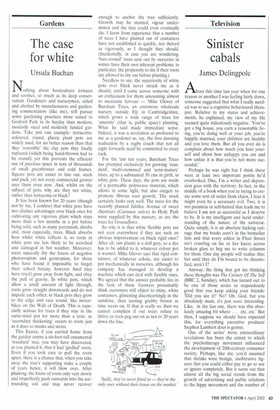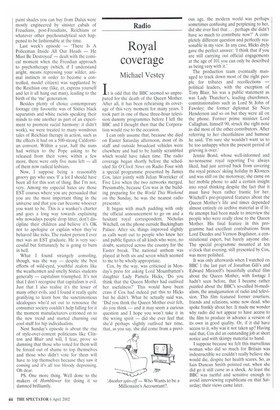Sinister cabals
James Delingpole
About this time last year when for one reason or another I was feeling fairly down, someone suggested that what I really needed was to see a cognitive behavioural therapist. Relative to my status and achievements, he explained, my view of my life seemed quite ridiculously negative. 'You've got a big house, you earn a reasonable living, you're doing well at your job, you're happily married, your children are healthy and you love them. But all you ever do is complain about how much you hate yourself and about how unhappy you are and how unfair it is that you're not more successful.'
Perhaps he was right but I think there were at least two important points he'd overlooked. One, I'm a writer and depression goes with the territory. In fact, in the middle of a book when you're trying to create some sort of order from chaos, I fear it might even be a necessary evil. Two, it is not paranoia or self-hatred that leads me to believe I am not as successful as I deserve to be. It is my intelligent and lucid understanding of the nature of the universe. Quite simply, it is an absolute fucking outrage that my books aren't in the bestseller lists and that every editor in Fleet Street isn't crawling on his or her knees across broken glass to beg me to write columns for them. One day people will realise this; but until they do I'm bound to be dissatisfied, aren't I?
Anyway, the thing that got me thinking these thoughts was The Century Of The Self (BBC 2, Sunday), which has turned out to be one of those series so stupendously good that you keep asking your friends: 'Did you see it? No? Oh, God, but you absolutely must, it's just s000 interesting. Like, in the last one, there was this absolutely amazing bit where .. . etc. etc.' But then, I suppose we should have expected this, for everything executive producer Stephen Lambert does is genius.
One of the series' more extraordinary revelations has been the extent to which the psychotherapy movement influenced the development of 20th-century consumer society. Perhaps, like me, you'd assumed that shrinks were benign, unobtrusive figures that you could either pay to go to see or ignore completely. But it turns out that almost all the big social trends from the growth of advertising and public relations to the hippy movement and the number of paint shades you can buy from Dulux were mostly engineered by sinister cabals of Freudians, post-Freudians, Reichians or whatever other psychoanalytical sect happened to be fashionable at the time.
Last week's episode — 'There Is A Policeman Inside All Our Heads — He Must Be Destroyed' — dealt with the comical moment when the Freudian approach to psychotherapy (which, if I understand aright, means repressing your wilder, animal instincts in order to become a controlled, model citizen) was supplanted by the Reichian one (like, er, express yourself and let it all hang out man), leading to the birth of the 'me' generation.
Besides plenty of choice contemporary footage (my favourite was of Sixties black separatists and white racists speaking their minds to one another as part of an experiment to promote racial harmony: it didn't work), we were treated to many wondrous tales of Reichian therapy in action, such as the effects it had on a 500-strong Californian convent. Within a year, half the nuns had written to the Pope asking to be released from their vows; within a few more, there were only five nuns left — all of them now radical lesbians.
Now, I suppose being a reasonably groovy guy who uses T a lot I should have been all for this sort of thing. But I'm not, very. Among my especial hates are those EST courses where you are persuaded that you are the most important thing in the universe and that you can become whoever you want to be. This is a wanker's charter and goes a long way towards explaining why nowadays people drop litter, don't discipline their children and believe it's OK not to apologise or explain when they've behaved like ticks. The rudest person I ever met was an EST graduate. He is very successful but fortunately he is going to burn in hell.
What I found strangely consoling, though, was the way — despite the best efforts of wild-eyed, youthful zealots like the weathermen and smelly Sixties students generally — capitalism triumphed. It's not that I don't recognise that capitalism is evil, Just that I also realise it's the lesser of many other evils, and I found it really quite gratifying to learn how the sanctimonious idealogues who'd set out to renounce the consumer society couldn't help falling for it the moment manufacturers cottoned on to the new trend and started churning out cool stuff for hip individualists.
Next Sunday's episode is about the rise of style-over-content politicians like Clinton and Blair and will, I fear, prove so damning that those who voted for them will be forced out of shame to top themselves and those who didn't vote for them will have to top themselves because they saw it coming and it's all too bloody depressing. Oh dear.
PS. One more thing. Well done to the makers of Hornblower for doing it so damned brilliantly.































































 Previous page
Previous page